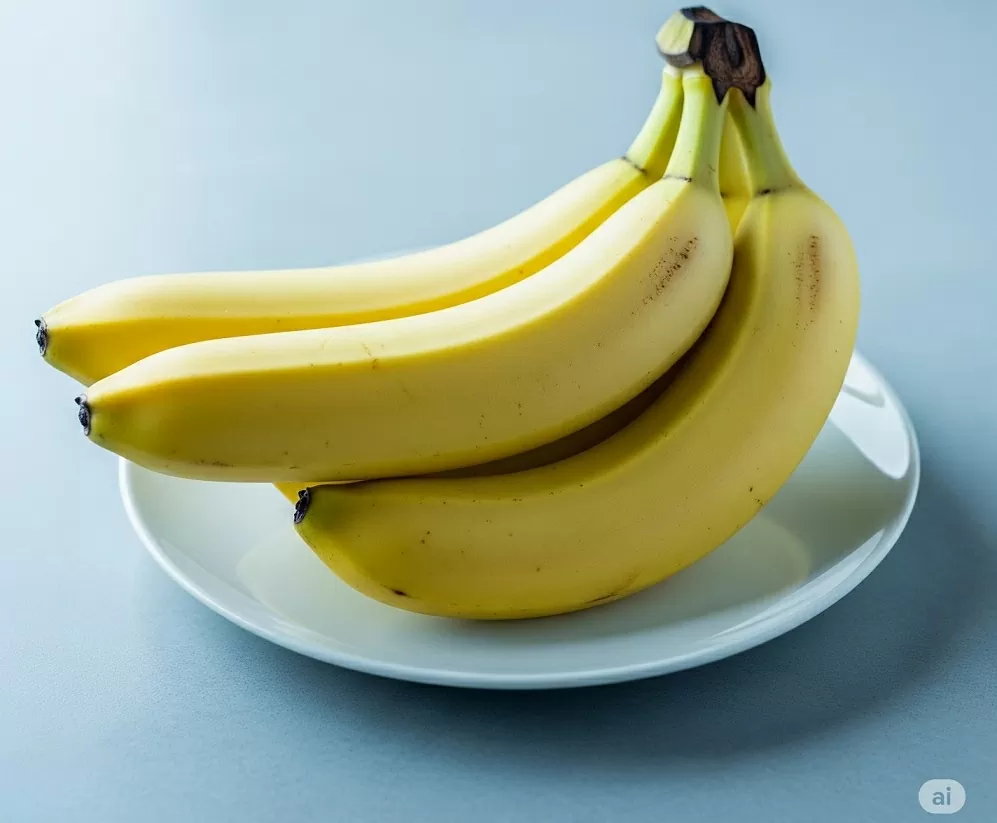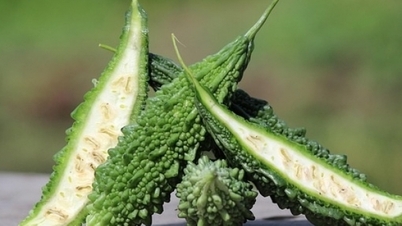 |
| Bananas are rich in potassium, which is especially good for the elderly. (Illustration photo created by AI) |
Thanks to their natural sweetness, high nutritional value and convenience, bananas can be easily incorporated into your daily diet – from snacks, smoothies to workout snacks.
In particular, eating a banana every day can help improve the health of your teeth, bones, joints, heart, brain and many other organs.
Below are the most prominent effects that this tropical fruit brings.
1. Good for oral and gum health
Bananas are rich in vitamin C, which helps protect the health of your teeth and gums. According to WebMD (US health information site), one banana provides about 10mg of vitamin C, equivalent to 10-13% of the recommended daily requirement.
Vitamin C acts as an anti-free radical and helps reduce the risk of gingivitis and periodontal disease.
A study in BDJ Open (dental research journal of the Nature system, UK) shows that a diet rich in fruits such as bananas has a positive impact on gum health.
2. Helps prevent osteoporosis
Statistics from the National Osteoporosis Foundation show that about 50% of women and 25% of men over 50 years old are at risk of bone fractures due to osteoporosis.
Meanwhile, bananas are rich in potassium - an electrolyte that helps balance acid-base in the body and limits calcium loss through urine.
According to WebMD, foods rich in potassium help preserve bone density and reduce the risk of osteoporosis, so bananas are especially good for the elderly.
3. Good for the heart and kidneys
With 422mg of potassium in each medium-sized banana (equivalent to 9% of daily needs), bananas help regulate blood pressure, reduce the risk of kidney stones and protect the heart.
Medical News Today (international medical news site) said that potassium helps stabilize heart rate, balance electrolytes and maintain blood pressure at safe levels. However, people with kidney disease should consult their doctor before increasing bananas in their diet.
4. Helps improve sleep
Bananas contain magnesium, potassium and tryptophan - substances that help relax muscles, reduce nervous tension and stimulate the production of melatonin, the hormone that regulates sleep.
According to the National Sleep Foundation, adding magnesium-rich foods like bananas to your dinner can help you fall asleep easier and sleep more deeply.
5. Supports weight loss
Bananas are rich in fiber, especially resistant starch found in slightly green bananas, which helps increase satiety and reduce appetite. According to Healthline (international health information site), resistant starch not only reduces calorie intake but also improves gut health and reduces belly fat.
A study by Harvard Health Blog (a medical blog of Harvard University) shows that fiber supplements help lose weight effectively when combined with a balanced diet.
6. Improve digestion and gut health
Bananas provide resistant starch - a natural prebiotic that helps nourish beneficial bacteria, balance intestinal microflora and aid digestion.
BBC Good Food ( BBC 's nutrition section) says that a healthy gut environment not only reduces bloating and stomach pain but also boosts immunity.
A study published in Anaerobe (a journal of intestinal microbiology research) showed that eating 2 bananas/day significantly reduces bloating symptoms.
7. Quick energy supplement
Thanks to their natural carbohydrate content (glucose, fructose, sucrose) and fiber, bananas are a source of sustainable energy.
According to Medical News Today, bananas provide an instant and long-lasting energy boost, making them perfect before and after exercise. Research published in PLoS One (an American scientific journal) found that bananas provide energy equivalent to sports drinks for cyclists.
8. Good for the lungs
Potassium in bananas helps maintain lung function and lung capacity. According to nutritionist Lisa Richards, adequate potassium intake, especially from a young age, helps keep lungs healthy and reduces the risk of chronic respiratory diseases.
WebMD cites research showing that a diet rich in fruits like bananas helps improve lung function in people with chronic obstructive pulmonary disease (COPD).
9. Supports healthy liver function
Bananas contain potassium and fiber, which help regulate blood sugar and cholesterol levels, reducing the metabolic burden on the liver. According to WebMD, a diet rich in potassium helps reduce non-alcoholic fatty liver disease.
In addition, bananas also help purify toxins, protect the liver from damage and enhance metabolic function.
10. Stabilize blood pressure
Bananas help reduce the negative effects of sodium on blood vessel walls, thereby stabilizing blood pressure. The CDC (Centers for Disease Control and Prevention) says that nearly 50% of American adults have high blood pressure and potassium supplements can reduce this risk.
America's leading medical center Cleveland Clinic explains that potassium helps reduce blood vessel stiffness, helping blood circulate more smoothly.
11. Supports post-workout recovery
A natural source of carbohydrates and potassium, bananas help replenish muscle glycogen, reduce cramps and balance electrolytes after exercise.
According to health nutrition experts, carbohydrates in bananas promote insulin production, support faster recovery and limit muscle soreness after exercise.
12. Good for brain health
Bananas are rich in vitamin B6 - an important nutrient for nerve activity, helping to regulate mood, improve memory and concentration.
B6 also helps reduce the risk of Alzheimer's, Healthline says. One cup of sliced bananas provides up to 32% of the daily vitamin B6 requirement.
Bananas are a cheap, easy-to-find fruit that has many significant health benefits. From improving digestion, helping you sleep well, protecting your heart and blood pressure, to losing weight and supporting your nervous system, bananas deserve to be on your daily menu.
However, people with kidney disease, diabetes or hyperkalemia should consult a specialist before regular use.
Source: https://baoquocte.vn/12-tac-dung-cua-chuoi-doi-voi-suc-khoe-tham-khao-y-kien-chuyen-gia-khi-can-320988.html




![[Photo] General Secretary To Lam attends the 95th Anniversary of the Party Central Office's Traditional Day](https://vphoto.vietnam.vn/thumb/1200x675/vietnam/resource/IMAGE/2025/10/18/1760784671836_a1-bnd-4476-1940-jpg.webp)

![[Photo] Collecting waste, sowing green seeds](https://vphoto.vietnam.vn/thumb/1200x675/vietnam/resource/IMAGE/2025/10/18/1760786475497_ndo_br_1-jpg.webp)
![[Photo] Closing ceremony of the 18th Congress of Hanoi Party Committee](https://vphoto.vietnam.vn/thumb/1200x675/vietnam/resource/IMAGE/2025/10/17/1760704850107_ndo_br_1-jpg.webp)




































































































Comment (0)